
Nearly one year ago, Occupy Century Aluminum retirees were standing on this very spot, the median on Route 2 just outside of town, breaking down their 75-day winter encampment at the entrance to Century’s aluminum smelter in Ravenswood, West Virginia. Back then, as they packed tents, rolled up sleeping bags and boxed up their mobile kitchen, they were celebrating a great victory in the fight for the return of their retiree health care benefits, cancelled by Century after the facility closed in 2009.
Today, Century has yet to fulfill their end of the bargain and return those benefits. Refusing to wait any longer, the retirees are back out here, again taking up the fight against the company. On March 7, 2013, they set up canopies, fire barrels, signs and a cemetery filled with crosses, each one representing a retiree who has passed away since Century took away their health care. This 24-hour protest was just the start of new efforts to pressure the aluminum giant to honor the agreement reached with them on March 1, 2012.
To understand why these retirees, most of them grandparents – their average age is 70 – have returned to protest on this cold March day, one needs to know how it all began. In 2009, Century Aluminum shuttered its smelter in Ravenswood, axing 651 workers, but promising to live up to contracts that provided lifetime health care benefits for its employees after the shutdown. Less than a year later, Century sent letters informing retirees their health coverage would be dropped, even though, for decades, weekly paycheck deductions to fund it were made.
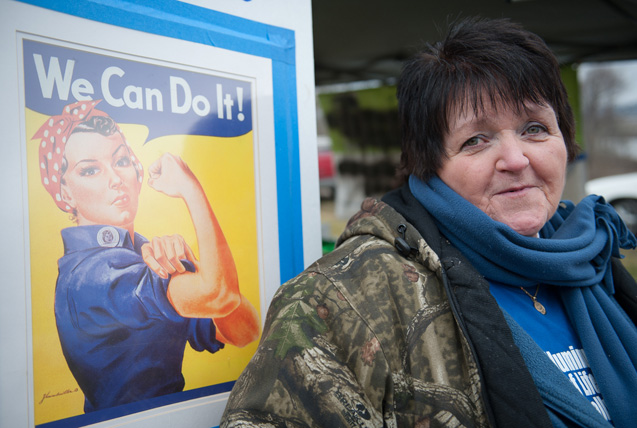 Karen Gorrell, also known as “Mama K” has been leading the group of Century Aluminum retirees since 2011 in the fight for the return of their healthcare benefits from the company.
Karen Gorrell, also known as “Mama K” has been leading the group of Century Aluminum retirees since 2011 in the fight for the return of their healthcare benefits from the company.
Many of those affected, some having been retired for as long as 15 years by then, were now without health insurance, as were their families – and getting it would prove to be difficult. Costly premiums were financially out of reach for most; others were uninsurable because of their age or pre-existing conditions. Karen Gorrell, wife of Century retiree Mike Gorrell, decided to take up the fight against the company after a meeting one night back in 2010 at the local 5668 United Steelworkers union hall in Ravenswood to discuss the termination of their benefits. Outside she met Bryce Turner, also a retiree, and his wife. Turner had just been diagnosed with leukemia and was uncertain how he was going to manage without health care. “They knew they worked in extremely hazardous conditions, so they knew that when they got older, they were desperately going to need their health care,” says Gorrell. She cried all the way home that night. It was then, she says, that she realized something had to be done, although taking on Century seemed impossible.
Gorrell says she told her daughter in a debate at home: “Jodi, this is corporate America. You can’t fight corporate America!” But her daughter encouraged her: “Mom, you can. You have more fire in your britches than anybody I’ve ever met in my life and you can do this.” Her family helped her realize that it was time to stand up. “So from that day on, it was me against the world.”
Although Gorrell began writing her legislators at first, she was not so sure those letters would ever be read. Calling them to set up meetings seemed more direct. “Shockingly, they agreed,” she said. The first meeting with legislative representatives was in January 2011. After that, Gorrell and other retirees traveled the state and to other Century plants around the country, campaigning for the return of their benefits, going as far as California to the company headquarters, where she spoke at the company’s annual shareholders’ meeting in 2011.
 After waiting more than one year since signing an agreement with Century Aluminum for the return of their healthcare benefits, Occupy Century Aluminum retirees are taking up their fight again by staging a 24-hour protest at the entrance to the company’s facility in Ravenswood, W.Va.
After waiting more than one year since signing an agreement with Century Aluminum for the return of their healthcare benefits, Occupy Century Aluminum retirees are taking up their fight again by staging a 24-hour protest at the entrance to the company’s facility in Ravenswood, W.Va.
It was later that year that Occupy Wall Street began its protests in Manhattan’s financial district. Gorrell explains: “Last year [2011] around Christmas, the Occupy movement was big and I got so tired of seeing on TV young people pepper-sprayed and being [dragged] off the street and the sad part to me was, as strong as the movement was, nobody was having a voice as to what we need.
“And I thought, if you are going to fight, you have to have a clear message as to what you need. And we knew what we needed; we needed the health care that we paid for. We felt as older, maybe tiny-bit wiser people, that we could put a new face to Occupy.”
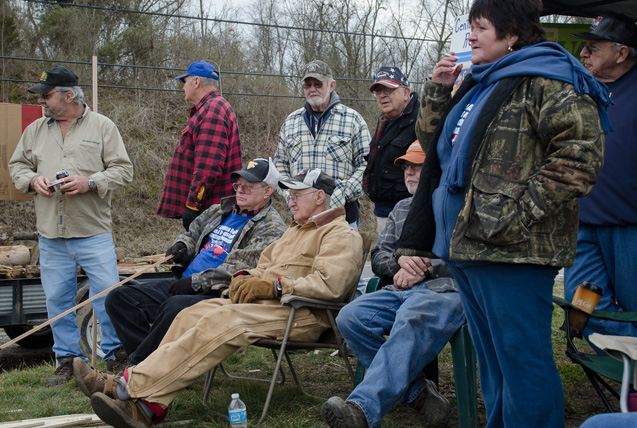 Occupy Century Aluminum retirees sit around the fire barrel exchanging stories during their 24-hour ‘reoccupation’ of their old protest encampment outside the entrance to the Century Aluminum facility.
Occupy Century Aluminum retirees sit around the fire barrel exchanging stories during their 24-hour ‘reoccupation’ of their old protest encampment outside the entrance to the Century Aluminum facility.
Gorrell said she proposed her plan during a meeting of Century retirees just before Christmas 2011. “I got this crazy idea: it’s going to be a huge sacrifice, but I think we ought to go down to the entrance to the plant, pitch a few tents, and just pile in there until Century gives us our health care back. I said that it’s going to be a big sacrifice and Christmas is coming, so I understand if you say no, but I can’t do this by myself – how many volunteers I got?” To her surprise, “The hands just started going one after the other, and I mean, it brought me to tears.” That’s when Occupy Century Aluminum was born, and Karen Gorrell, affectionately known as “Mama K,” became their leader.
Soon after, on December 18, 2011, the retirees launched their occupation at the entrance to the plant, camping out for 75 days straight. “We came in and started with a little canopy and one tent, a summer tent at that, in the middle of West Virginia in the winter, and we continued to add to it, and before long we had microwaves and Christmas trees and burning lights and coffee pots,” she recalls.
 For 75 days, Dec. 18, 2011 – March 2, 2012, the Occupy Century Aluminum retirees braved the winter cold and snow, camping out at the entrance to the Century Aluminum facility in Ravenswood, W. Va., staying until Century agreed to return their healthcare benefits.
For 75 days, Dec. 18, 2011 – March 2, 2012, the Occupy Century Aluminum retirees braved the winter cold and snow, camping out at the entrance to the Century Aluminum facility in Ravenswood, W. Va., staying until Century agreed to return their healthcare benefits.
It was not only their presence for those many days in front of the plant that eventually brought Century to the negotiating table: “We got our state engaged, we got our governor – we chased him down – ya know, we went to Charleston time and time again, telling him, we have supported this state all of our life; we’ve paid tax dollars all of our life; we’ve asked for nothing. We’ve worked hard; we’ve never drawn a welfare check; we are desperate; we need your help.” After delivering this message to their state legislators, she says, “Our state wrapped their arms around us and embraced us and they’ve never let go.”
Meanwhile, Century was working toward reopening the facility. Hoping to secure a more advantageous rate for power to get the plant up and running, they planned to approach the West Virginia legislature for help. The retirees met with state representatives about the issue. “We told them, help Century get the plant started, but don’t you dare help them and give them our tax dollars until you take care of – make them – take care of the retirees,” Gorrell recounted. “And thank God, they thought that was fair enough.” When legislators and Century representatives eventually met, lawmakers refused to help until the company reached an agreement with the retirees for the return of their health care benefits.
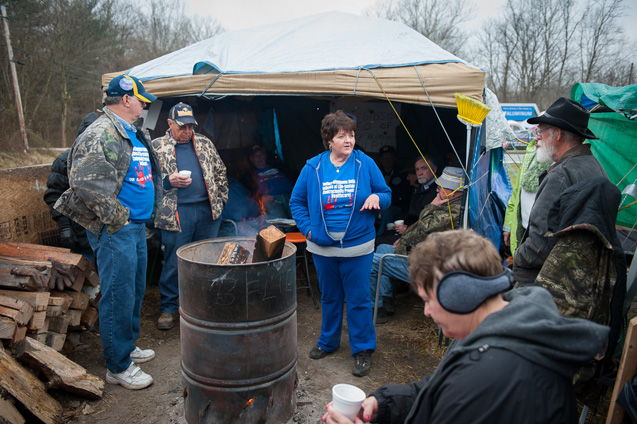 Last February, during their occupation at the entrance to the Century facility, retirees listen to Mama K as she fills them in on the progress of negotiations with the company for the return of their benefits.
Last February, during their occupation at the entrance to the Century facility, retirees listen to Mama K as she fills them in on the progress of negotiations with the company for the return of their benefits.
With continued pressure from fellow residents, local government, state legislators and the governor himself, the retirees finally reached a tentative settlement with Century on March 1, 2012. The company would pay a minimum of $44 million over the next ten years toward its coverage, provided it was able to restart the Ravenswood plant.
The next day, in accordance with the agreement, Occupy Century Aluminum took down their camp and celebrated what they believed to be a resounding victory over a corporate giant. Later, after the final deal was signed, Gorrell remembers Century’s Vice President of North American Operations, John Hoerner, telling her he expected the plant to be up and running by July 2012.
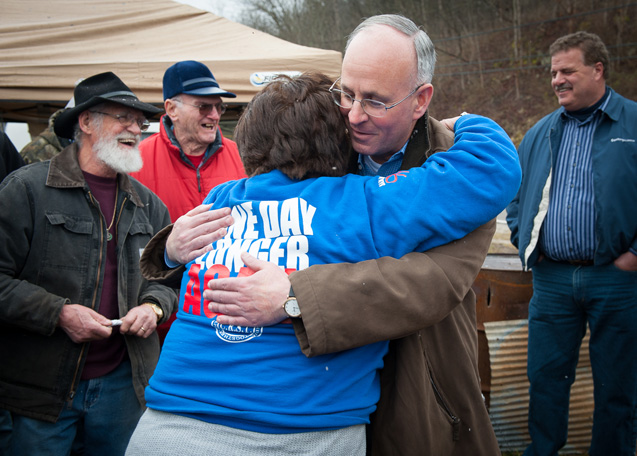 Mama K and Century Aluminum CEO Michael Bless hug after a meeting at the camp in front of the Century facility in February 2012. The visit came one month before the retirees and Century Aluminum finally reached a deal for the return of their benefits, Century’s CEO Michael Bless and V.P. of North American Operations John Hoerner were at their encampment to listen to their grievences. Although the talk was heated and emotional at times during his visit, both Karen and Bless hugged and thank each other for their honest and open discussion.
Mama K and Century Aluminum CEO Michael Bless hug after a meeting at the camp in front of the Century facility in February 2012. The visit came one month before the retirees and Century Aluminum finally reached a deal for the return of their benefits, Century’s CEO Michael Bless and V.P. of North American Operations John Hoerner were at their encampment to listen to their grievences. Although the talk was heated and emotional at times during his visit, both Karen and Bless hugged and thank each other for their honest and open discussion.
After reaching the agreement, Century, with the help of the retirees, managed to negotiate new favorable tax legislation with West Virginia lawmakers, in addition to a deal with the Public Service Commission of West Virginia (PSC) that would potentially save the company over half a billion dollars in energy costs at the plant over the next decade. Even after receiving these discount rates from the PSC, Century walked away from the deal in October 2012 because it was unwilling to make up any shortfalls in the rate that may have occurred over the next ten years. The company is also threatening to close a smelter in Kentucky if it cannot get reduced electric rates.
“Century Aluminum remains committed to both restarting the Ravenswood smelter and the agreement it reached with the retirees regarding healthcare benefits. Towards this end, we continue to be actively engaged in discussions with the energy providers to secure energy for the facility at rates that would enable an economic restart and allow the plant to remain viable,” Century Aluminum spokesperson Mike Dildine said in an email statement.
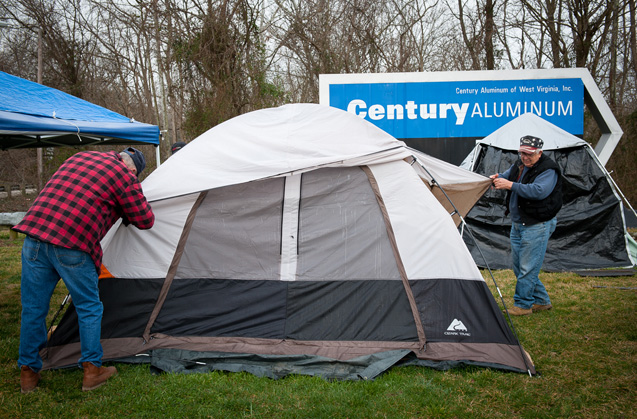 After 75 days of camping out in front of the Century Aluminum facility and finally reaching what they thought was a good agreement with the company, the retirees broke camp and ended their protest. Retirees Bob Blare, 75 (left) and Roy Dailey, 76 (right), begin the process of tearing down tents at the camp.
After 75 days of camping out in front of the Century Aluminum facility and finally reaching what they thought was a good agreement with the company, the retirees broke camp and ended their protest. Retirees Bob Blare, 75 (left) and Roy Dailey, 76 (right), begin the process of tearing down tents at the camp.
As bargaining continues, the reality of the plant’s reopening slips further away while Century continues to hold out on returning the health care it promised to give back. Now one year on, Occupy Century Retirees are tired of waiting.
Bryce Turner, the man who inspired Mama K and the others to stand up against Century when this struggle began, died before he ever had his benefits returned. And now, with the clock ticking for all of them, Gorrell and the others take up their struggle once again to fight for their lives, in his honor.
 Charles “Smitty” Smith (left) and Roy Dailey (right) take down the American flag at the Occupy Century Aluminum camp March 2, 2012 in Ravenswood, W. Va. Occupiers broke camp after Century caved to their demands with a $44 mil settlement to refund healthcare that will benefit 500 families in the community. The group occupied the site at the entrance to the Century Aluminum smelter for 75 days in protest of company’s actions that eliminated their retiree healthcare benefits.
Charles “Smitty” Smith (left) and Roy Dailey (right) take down the American flag at the Occupy Century Aluminum camp March 2, 2012 in Ravenswood, W. Va. Occupiers broke camp after Century caved to their demands with a $44 mil settlement to refund healthcare that will benefit 500 families in the community. The group occupied the site at the entrance to the Century Aluminum smelter for 75 days in protest of company’s actions that eliminated their retiree healthcare benefits.
Join us in defending the truth before it’s too late
The future of independent journalism is uncertain, and the consequences of losing it are too grave to ignore. To ensure Truthout remains safe, strong, and free, we need to raise $44,000 in the next 6 days. Every dollar raised goes directly toward the costs of producing news you can trust.
Please give what you can — because by supporting us with a tax-deductible donation, you’re not just preserving a source of news, you’re helping to safeguard what’s left of our democracy.